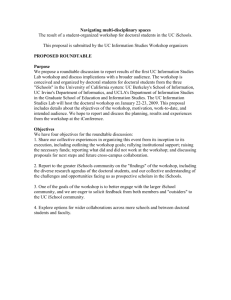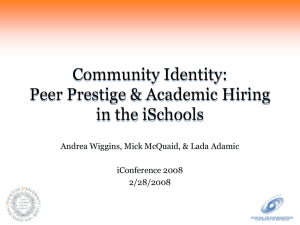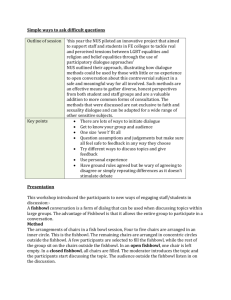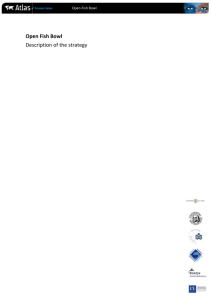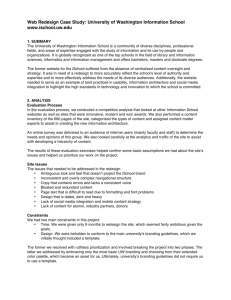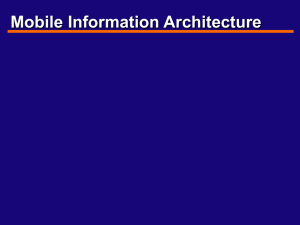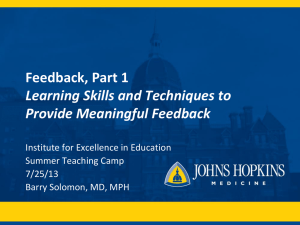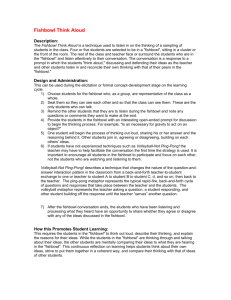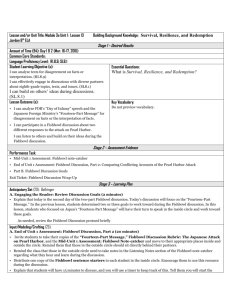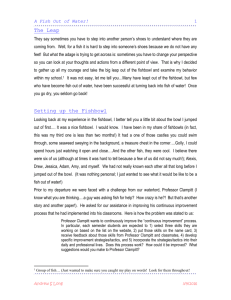Teaching_Resear ols_fishbowl_format-1
advertisement
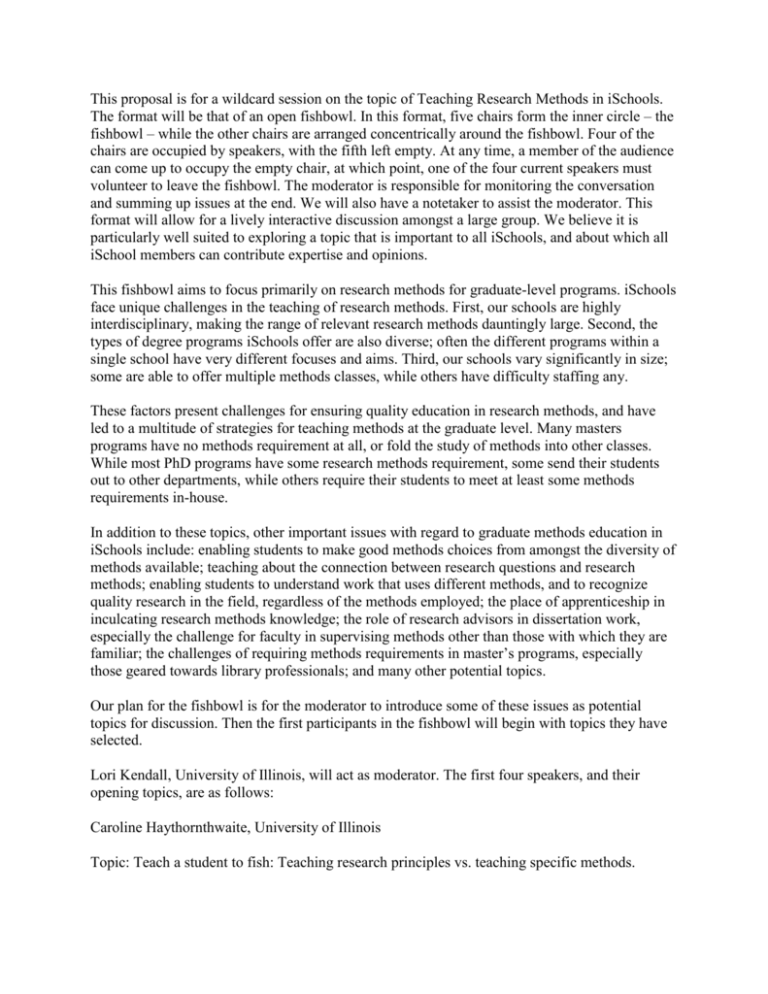
This proposal is for a wildcard session on the topic of Teaching Research Methods in iSchools. The format will be that of an open fishbowl. In this format, five chairs form the inner circle – the fishbowl – while the other chairs are arranged concentrically around the fishbowl. Four of the chairs are occupied by speakers, with the fifth left empty. At any time, a member of the audience can come up to occupy the empty chair, at which point, one of the four current speakers must volunteer to leave the fishbowl. The moderator is responsible for monitoring the conversation and summing up issues at the end. We will also have a notetaker to assist the moderator. This format will allow for a lively interactive discussion amongst a large group. We believe it is particularly well suited to exploring a topic that is important to all iSchools, and about which all iSchool members can contribute expertise and opinions. This fishbowl aims to focus primarily on research methods for graduate-level programs. iSchools face unique challenges in the teaching of research methods. First, our schools are highly interdisciplinary, making the range of relevant research methods dauntingly large. Second, the types of degree programs iSchools offer are also diverse; often the different programs within a single school have very different focuses and aims. Third, our schools vary significantly in size; some are able to offer multiple methods classes, while others have difficulty staffing any. These factors present challenges for ensuring quality education in research methods, and have led to a multitude of strategies for teaching methods at the graduate level. Many masters programs have no methods requirement at all, or fold the study of methods into other classes. While most PhD programs have some research methods requirement, some send their students out to other departments, while others require their students to meet at least some methods requirements in-house. In addition to these topics, other important issues with regard to graduate methods education in iSchools include: enabling students to make good methods choices from amongst the diversity of methods available; teaching about the connection between research questions and research methods; enabling students to understand work that uses different methods, and to recognize quality research in the field, regardless of the methods employed; the place of apprenticeship in inculcating research methods knowledge; the role of research advisors in dissertation work, especially the challenge for faculty in supervising methods other than those with which they are familiar; the challenges of requiring methods requirements in master’s programs, especially those geared towards library professionals; and many other potential topics. Our plan for the fishbowl is for the moderator to introduce some of these issues as potential topics for discussion. Then the first participants in the fishbowl will begin with topics they have selected. Lori Kendall, University of Illinois, will act as moderator. The first four speakers, and their opening topics, are as follows: Caroline Haythornthwaite, University of Illinois Topic: Teach a student to fish: Teaching research principles vs. teaching specific methods. Questions: How do we best prepare iSchool students to do research in our interdisciplinary field? Would it be adequate to teach principles of research rather than specific methods? If we do so, will students be able to fish on their own? What are the essentials we would need to teach? If we choose to teach specific methods, how many are enough, and which ones should they be? Andrea Tapia, Pennsylvania State University Topic: Mixed methods as bad chowder Because of the truly interdisciplinary nature of the iSchool environment, graduate students are often exposed to a diverse and lengthy list of potential research (collection and analysis) methods--rather like a large urban foreign fish market. If given the task of preparing a fish/seafood soup/chowder, the novice simply walks through the market and piles her basket high with whatever fish and seafood look "pretty" or "clean" or "fancy." The more, and the more diverse, the better. This usually ends up with a strange and lumpy concoction, a rotten tasting soup, and a smelly kitchen. Graduate students often confuse piling up of diverse methods with the concept of triangulation. They often mistakenly believe that all methods mix well together and that more is always better. These students are also seeking higher validity and reliability in their research by simply adding another method, another case, another site, etc. Add a survey -- it'll taste better! It is particularly important that in the iSchool environment where graduate students are exposed to such diversity of techniques that they learn to choose methods that are consistent with their epistemology and answer their research question(s). It is also important that we give our students the tools necessary to blend methods only when needed, delicately, subtly, and with precision. Karen Fisher, University of Washington Topic: Faculty as Fishmongers: How do we teach what we don’t do? Regardless of what data-gathering method we use as researchers, as faculty we must often mentor students who are using methods with which we are unfamiliar. Many of us work with students who obtained their methods training in disciplines other than our own or received no training at all. Thus with some we can build on ideas of research process, but with others we start at the very beginning of what it means to do research. Some of us are also called upon to teach methods survey courses and must choose between depth in a few methods or a set of smorgasbord-style guest lectures. These challenges are particularly acute in the interdisciplinary environment of most iSchools. Achieving a core of disciplinary methods is vital for a strong field. How will -- or should we -- go about creating that core? Can we cover all methods, or do the iSchools need a common understanding of how research is conducted for our field? Diane Kelly, University of North Carolina Topic: Research Methods and Data Analysis: The Buffet Model Leads to Floundering Single semester general research methods courses are like buffets – students nibble on many different things, but don't eat anything long enough to really appreciate, understand and reproduce it. Especially problematic is that a one semester course does not leave adequate time to teach students about data analysis methods. Both qualitative and quantitative data analysis methods are important in our field and I'd like to advocate for a separate course (in addition to research methods) that focuses on data analysis techniques. All students who graduate with a master's degree from an iSchool should be able to understand, evaluate and apply basic data analysis techniques. It is particularly important that students (and professionals) do not flounder at the sight of statistics and grounded theory. These topics will serve as opening statements to get the dialogue going. We expect other topics, including many we may not have thought of, to emerge from the audience participation. Several other members of the iSchool community contacted during the preparation of this proposal indicated an intention to attend and take part in the discussion.
